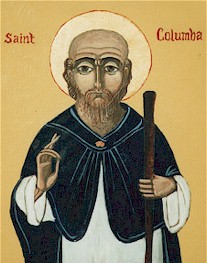Introduction

Born: December 7, 521, Garten, County Donegal, Ireland.
Died: June 9, 597, Iona, Scotland.
Buried: Iona, Scotland.
.jpg)
John Duncan (1866–1945)

Born: December 7, 521, Garten, County Donegal, Ireland.
Died: June 9, 597, Iona, Scotland.
Buried: Iona, Scotland.
.jpg)
A member of Clan O’Neill, Columba descended from Irish royalty. He studied at the monastic school of Moville under Finian, then at Leinster under Gemman.
Upon entering the monastery at Clonard, he became a priest. In 563, he went to Scotland, where he became the Abbot of Iona and converted the northern Picts to Christianity.
He was also said to be one of the first to see the so called Loch Ness Monster.
The last faint gleam of the sunset gold
Hath sunk in the western wave.
Over the isle the night-winds blow,
Sighing tenderly, moaning low,
Like mourners o’er a grave.
’Tis meet, ’tis meet that his life should close
Where he watched and toiled so well.
How is he keeping this last, last night,
That the taper burns so late, so bright
In his sternly simple cell?
A scribe sits there with parchment scroll—
Now haste thee, my son, and write!
Take thou no rest till the death-rest fall,
And watch thou, too, for the Master’s call,
That cometh so oft at night.
The monk wrote on, with eager hand,
None other sound was there.
For the grief in his soul might find no breath
In the presence of work—in the presence of death,
Till the bell should sound for prayer.
I would thou hadst closed the golden psalm
With the close of this passing life.
But these words are meet for my last farewell—
They will call the next brother like matin bell
To pray for the holy strife.
The words that looked from the speaking page
That had touched so deep a chord
In the old man’s heart, would thine eyes, too, see?
They were, Come, ye children, hearken to me;
I will teach you the fear of the Lord.
’Tis the midnight bell! I will enter in
Where my children kneel, once more.
And there followed one, with torch a-light,
To guard his way through the gusty night
To the lowly entrance-door.
But he passed in alone, in the dark,
For the storm had quenched the lights.
And there, as he knelt on the ground to pray,
His soul with the midnight rose, and away
To its home on the holy heights.
They found him there, with the smile of God
On the calm of his saintly face.
And when the deep hush of their pain was o’er,
And they bare him out through the lowly door,
’Twas an anthem that filled the place.
They laid him low for his quiet sleep
By the Church’s western bound—
But a few of those that had loved him best!
For the storms were out; and of all the rest
No boat could cross the Sound.
Till the days grew calm, and they bore him back
To the land of his earliest love;
And a coffin was laid in his own green isle,
For her balmy tears, and her proud, sweet smile,
Though her saint was in rest above.
Rise up and fashion a tribute meet,
If ye may, to a life like this,
Whose glorious crown was of souls that rose
From a world of graves, from the ranks of foes,
To the land where Christ gives bliss.
Alessie Bond Faussett
The Cairns of Iona, and Other Poems, 1873